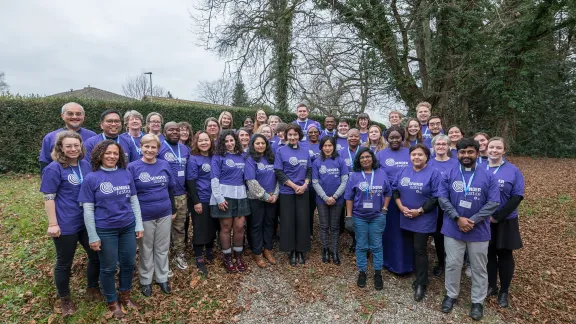
Participants in the 9 to 11 December Gender Justice Consultation. Photo: LWF/Albin Hillert
Participants at a Gender Justice Consultation recommit to the work of changing “hearts, minds and policies” to build more inclusive churches
(LWI) - The principles of The Lutheran World Federation (LWF) Gender Justice Policy, drawn up over a decade ago, remain relevant and vital to the work of building more inclusive churches and communities today. That was the affirmation shared by participants at the conclusion of a three-day Consultation in Geneva. The 9 to 11 December meeting brought together gender justice coordinators, Council members and other advocates working in churches around the worldwide communion.
LWF General Secretary Rev. Dr Anne Burghardt met with participants, urging them to continue putting “faith at the center of your work to change hearts, minds and policies.” In the LWF, we firmly believe in the God-given dignity of every human being, regardless of his or her gender,” she said, adding that the LWF was “a pioneer among Christian World Communions in producing a Gender Justice Policy.” The document, which was approved by the LWF Council, was launched on Human Rights Day, 10 December, in 2013.
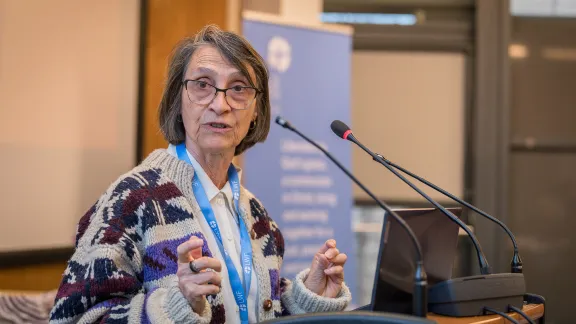
Argentinian feminist theologian Rev. Dr Mercedes Garcia Bachmann. Photo: LWF/Albin Hillert
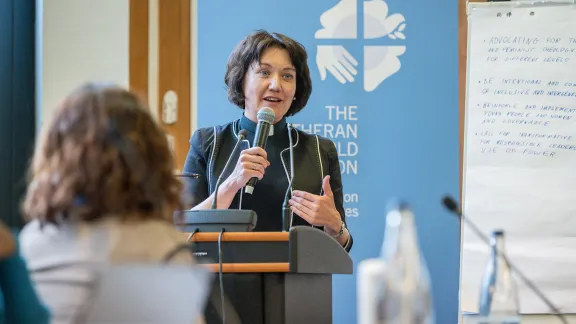
LWF General Secretary Rev. Dr Anne Burghardt speaks at the Gender Justice Consultation. Photo: LWF/Albin Hillert
As Lutherans, Burghardt continued, “we should read all the texts that we encounter in the Bible through the lens of justification by faith and through the principle of ‘what promotes Christ.’ This puts some of the passages in Scripture, which are used to question women’s leadership, into a different light.” She also warned against “the danger of a single story” by using individual Bible passages taken out of context.
The LWF leader highlighted the very diverse cultural contexts of churches, as well as the different legal frameworks in countries where member churches live and witness. Regardless of the context, she said “a lot remains to be done in all regions to raise awareness about the need to ensure equal possibilities for both men and women, as well as about the widespread problem of gender-based violence. Implementation of gender justice remains a crucial task, and it is important to include more men in this work.”
The consultation included daily worship, reflections and Bible studies looking at ways of countering problematic texts that are used to discriminate and deny women their equal rights in the church. Argentinian feminist theologian Rev. Dr Mercedes Garcia Bachmann urged participants to read a wide variety of commentaries on Scripture verses “to make the Bible our ally and not a hammer to shatter our dreams.”
Rev. Mbongeni Dube from Zimbabwe, a participant in the Helene Ralivao Fund training for theology, gender justice and leadership, suggested ways in which the biblical figure of Joseph can be used as “a model for positive masculinity which defies cultural conditioning to support the dignity of women.”
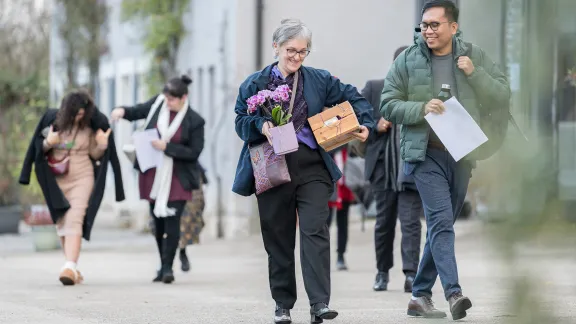
LWF Program Executive for Gender Justice and Women’s Empowerment Rev. Dr Marcia Blasi leads the way at the Gender Justice Consultation. Photo: LWF/Albin Hillert
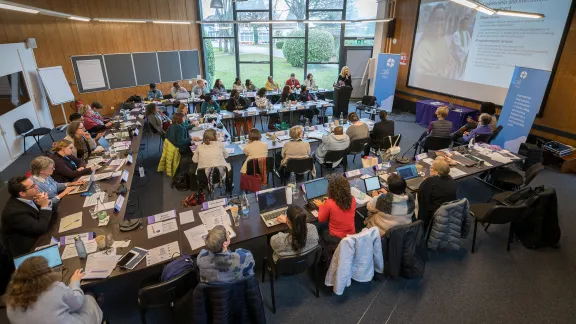
Participants learn about the way gender justice is integrated into the work of the LWF. Photo: LWF/Albin Hillert
Taking the Resolutions from the 2023 LWF Assembly in Kraków, Poland, as a guide, participants re-affirmed the principles of the Gender Justice Policy and discussed key areas of work for the coming years. These included a call for more theological and educational resources and tools, the use of inclusive language in liturgy and communications, greater intergenerational collaboration, strengthening advocacy to end harmful practices and the establishment of processes to monitor the policy’s implementation in local contexts.
LWF Program Executive for Gender Justice and Women’s Empowerment Rev. Dr Marcia Blasi noted that “the journey of implementation in our churches is a long one and there are different needs within the different regions. But it is good to see many young people in our networks, as well as men who want to be our allies in bringing this work to the grass roots. We need to integrate gender justice as a cross-cutting concern in all areas of our work and to include intersectional issues such as race, class, ethnicity or disability which often further marginalize and exclude women and girls.”
Blasi noted the consultation “has been an important step on our journey as we celebrate progress made over the past decade and explore how we can use our collective wisdom, skills and lived experiences to continue challenging patriarchal structures and power dynamics in our churches.” Referring to the backlash against women’s rights that is prevalent in many parts of the world today, she described “the three days of worship and Bible study, singing and storytelling, analysis and envisioning together” as a source of “new energy and a renewed hope that together we can make a difference.”
The 9 to 11 December Gender Justice Consultation is taking place in Geneva to celebrate achievements of the first decade since the adoption of the LWF Gender Justice Policy and to identify new strategies for building gender-just relations, theologies and churches within the LWF Communion and wider society.


